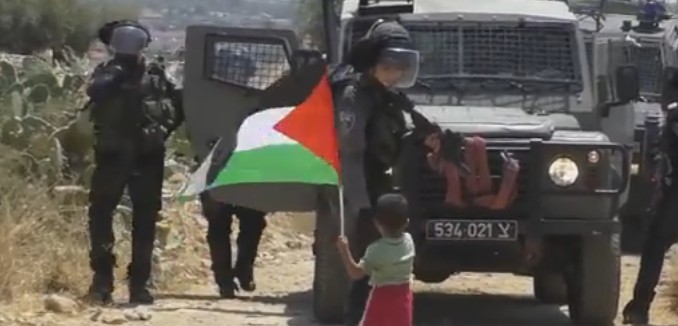A video emerged on Friday showing a Palestinian man urging Israeli soldiers to kill his toddler son so he could capture the shooting on camera. The father is seen shoving the young boy toward an armed soldier, who responds by giving the child a high-five.
The father continued egging the boy on, instructing him to throw rocks at the soldiers. Eventually, the child walked to the side and threw rocks away from the troops.
Leibel A. Mangel, who first posted the video on his Facebook page, said the child was identified as 3-year-old Muhammad Suroor.
This is not the first time that footage emerged of Palestinian parents pressing their children to confront soldiers so the troops’ response can be photographed and filmed. In 2012, a young Palestinian girl — Ahed Tamimi of Nabi Saleh in the West Bank — was filmed as she yelled at and shoved armed troops, seemingly in an attempt to provoke a reaction. Another young boy was forcefully pushed against an armed soldier during the same demonstration in the hopes of getting a response. (For more on the Tamimi family, see How a Family Became a Propaganda Machine, written by Petra Marquardt-Bigman in the November 2015 issue of The Tower Magazine.)
Palestinian children are often encouraged to honor those who carry out attacks against Israel, and to participate in such attacks themselves. Such incitement has long been tied to acts of terrorism by Israeli authorities and experts.
During the past school year, some Palestinian children wore military fatigues and held toy guns while performing in plays that depict the abduction and killing of Israelis. Over the summer, more than 50,000 Palestinian kids in the Gaza Strip attended three-week-long military training camps, which aim “to raise a generation of Palestinians who love the resistance and the liberation of Palestine and the Al-Aqsa Mosque,” according to the Gaza-based terrorist group Hamas. More than 10,000 Palestinian teenagers graduated from such camps in 2015. Palestinian children have also been seen brandishing weapons while participating in rallies alongside adults; footage from an October rally in Rafah, Gaza, showed a number of youths — including toddlers — holding blades as a sprawling crowd called for terrorist attacks against Jews.
In July, the Palestinian Authority’s official newspaper praised Palestinian youth who died after carrying out or attempting to carry out stabbing attacks against Israelis, claiming they followed “the path of excellence and superiority.” In April, the PA organized a high school reading program that praised a terrorist who murdered three people, including American peace activist Richard Lakin. The same terrorist was separately honored at three Palestinian universities.
Children’s cartoons aired on official Palestinian TV also demonize Jews and Israelis, and glorify those who attack them. A cartoon broadcast by Fatah TV during Ramadan featured Jews as agents of devils who opposed the Islamic prophet Muhammad. In past years, a Hamas children’s show featured a Mickey Mouse look-alike named Farfur who called for suicide bombings against Jews. Hamas claimed a previous character, Nahul the bee, died because Israel refused to give him access to medical care.
Multiple surveys of Palestinian public opinion have found widespread support for terror attacks against Israeli civilians, as well as negative perceptions of Jews. A poll conducted by a Ramallah-based firm over the first three months of 2016 found that more than 60 percent of Palestinians approve of “armed attacks against Israeli civilians inside Israel.” Of all age groups, youth between the ages of 18 and 22 were “the least supportive of the two-state solution” and “the most supportive of stabbing attacks,” according to the poll.
Dan Polisar, the provost of Shalem College, explained in Mosaic Magazine in November that these polls reveal the extent to which “Palestinian perpetrators of violence reflect and are acting on the basis of views widely held in their society.”
In How the Mufti of Jerusalem Created the Permanent Problem of Palestinian Violence, which was published in the November 2015 issue of The Tower Magazine, Edy Cohen linked the long history of Palestinian incitement against Jews and Israel to the infamous Mufti of Jerusalem, Haj Amin al-Husseini.
Haj Amin al-Husseini, known as the Mufti of Jerusalem, has suddenly become the object of considerable public discussion. The recent controversy over Israeli Prime Minister Benjamin Netanyahu’s remarks—in which he claimed, erroneously, that the Mufti had persuaded Adolf Hitler to exterminate the Jews—has brought sudden attention to one of the most important figures in the history of the Arab-Israeli conflict.
That’s because al-Husseini was not only the founding father of the Arab national movement in Palestine. He was also a fervent anti-Semite, the most important Nazi collaborator in the Arab world, and a political activist who worked tirelessly for the ethnic cleansing and physical destruction of the Jews in Palestine and in the Middle East as a whole.
As Israelis face yet another wave of violence at the hands of Palestinians, and we ask yet again about its causes, a serious look at the Mufti’s role in crafting, justifying, and encouraging such violence becomes crucial for our understanding. For the Mufti not only founded Palestinian nationalism as we know it today, but defined it as an ideology of absolute rejectionism and even genocide. In effect, the Mufti denied that the Jews had any national rights whatsoever, and especially not in the historic Land of Israel.
In this, the Mufti originated the single most important obstacle to peace in the Middle East: The Palestinian refusal to accept Jewish sovereignty and even physical presence in any part of the Land of Israel. In many ways, to understand the Mufti is to understand why the Palestinians, despite numerous opportunities to do so, still refuse to make peace.
[Photo: Leibel A Mangel / YouTube ]




